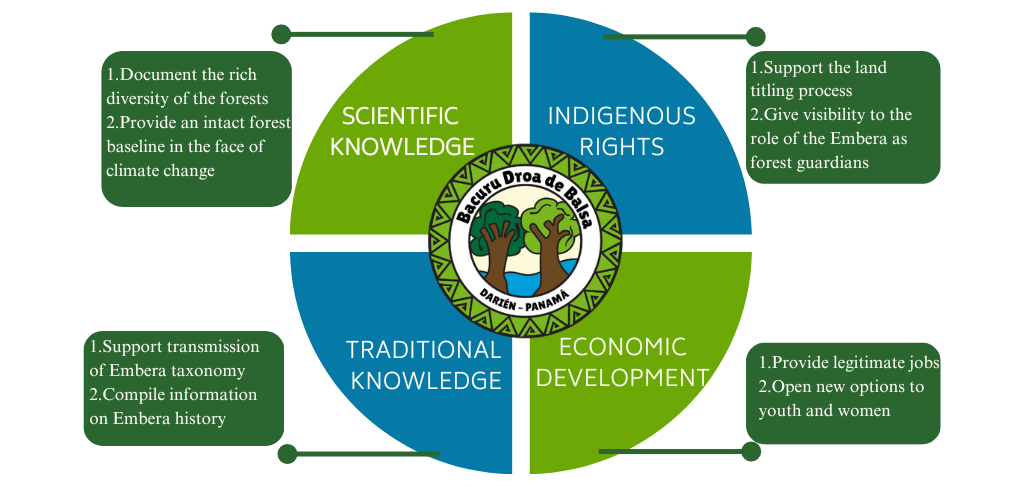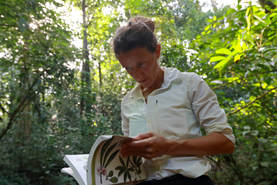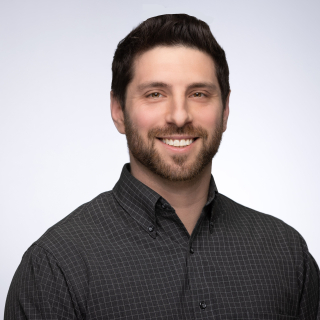An action research project
The project Bacurú Drõa (Old-Growth Forests) was co-developed in collaboration with the Traditional Emberá Authorities of Tierras Colectivas of Balsa.
Our objectives
- Establish a community-driven Old-Growth Forest Observatory in full partnership with the Emberá people of the Balsa River to enhance knowledge of old-growth forests, protect biodiversity and improve the local economy.
- Accompany the development of a local governance ensuring forest and species conservation, and cultural survival and food-security through capacity-building, empowering and innovative research driven methods.
The 4 spheres of the Bacurú Drõa project

Scientific Knowledge
- Document the rich diversity of the forests
- Provide an intact forest baseline in the face of climate change
Indigenous Rights
- Support the land titling process
- Give visibility to the role of the Emberá as forest guardians
Traditional Knowledge
- Support transmission of Emberá taxonomy
- Compile information on Emberá history
Economic Development
- Provide legitimate jobs
- Open new options to youth and women
These objectives will be achieved by training and working with the six communities of the Tierras Colectivas of Balsa to quantify forest carbon stocks, document tree diversity dynamics over time and carry out inventories of birds, mammals, frogs and insects. The data collected under Bacurú Drõa, the Old-Growth Forest Observatory, will not only be of scientific importance, but will also provide a basis for management plans.
A 15-hectare permanent forest plot established following the Forest-GEO methodology forms the scientific core of Bacurú Drõa. Initial results from the permanent plot highlight the presence of a much higher tree diversity than elsewhere in Panama as well as numerous undescribed species.
A 15-hectare permanent forest plot established following the Forest-GEO methodology

Management team
The Bacurú Drõa managing team comprises three Emberá coordinators:

Solio Bailarin
Administrative Coordinator

Alexis Ortega
Permanent Plot and Scientific Coordinator
Wilmer
Logistic Coordinator
Scientific committee
A scientific committee was formed to support and contribute to the project in diverse areas of research.
Daisy Dent
Research interests
Tropical forest ecology and conservation; Impacts of human disturbance on tropical forest ecosystems; Biodiversity monitoring; Secondary forest recovery; Species interactions.
Joseph Levitan
Research interests
Diversity, Identity & Indigenous Topics; Social Action & Sustainability Education; Teacher Education, Pedagogy & Leadership.
Catherine Potvin
Research interests
Physiological ecology; Global change; Experimental design and biostatistics; Conservation biology; Tropical ecology.
Juan Carlos Villarreal Aguilar
Research interests
Tropical plant diversity; Impact of fragmentation on epiphyllous bryophytes; Phyllosphere and nutrient flow.
Javier Mateo-Vega
Research Interests
Conservation biology and policy; Participatory forest biomass monitoring; Participatory visioning and scenario-based planning; Tropical ecology.
To ensure the long-term success of the project, we also propose fully engaging with the people of the Tierras Collectivas of Balsa by:
- Empowerment of the Balsa communities to allow them to shape their own future;
- Ensuring that the work of the Old Growth Forest Observatory includes women as well as men, youth as well as elders while technicians will be selected from each of the six communities by the traditional authorities.
- Ensuring that the knowledge building from Bacurú Drõa considers at the same time and with equal importance traditional and scientific knowledge systems.

